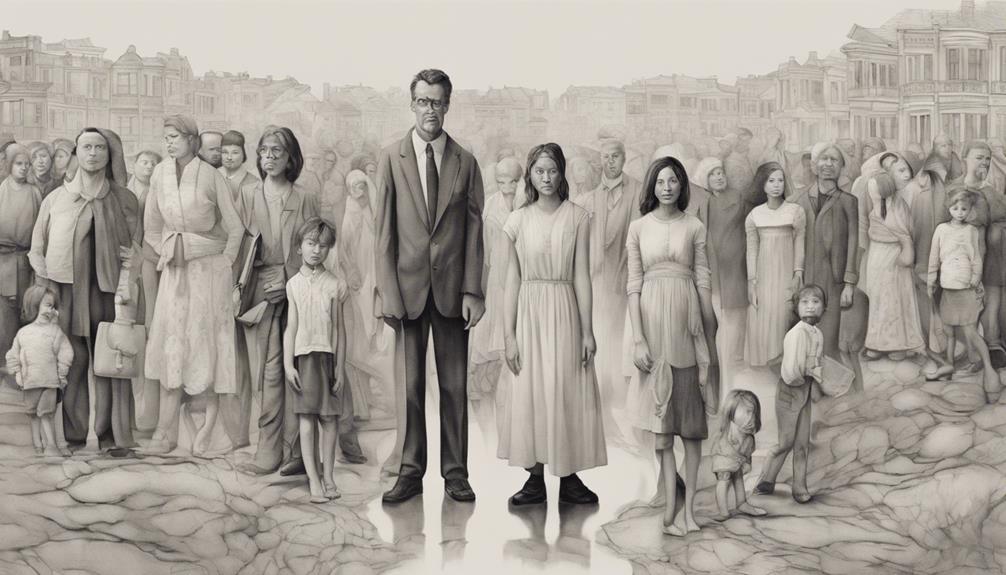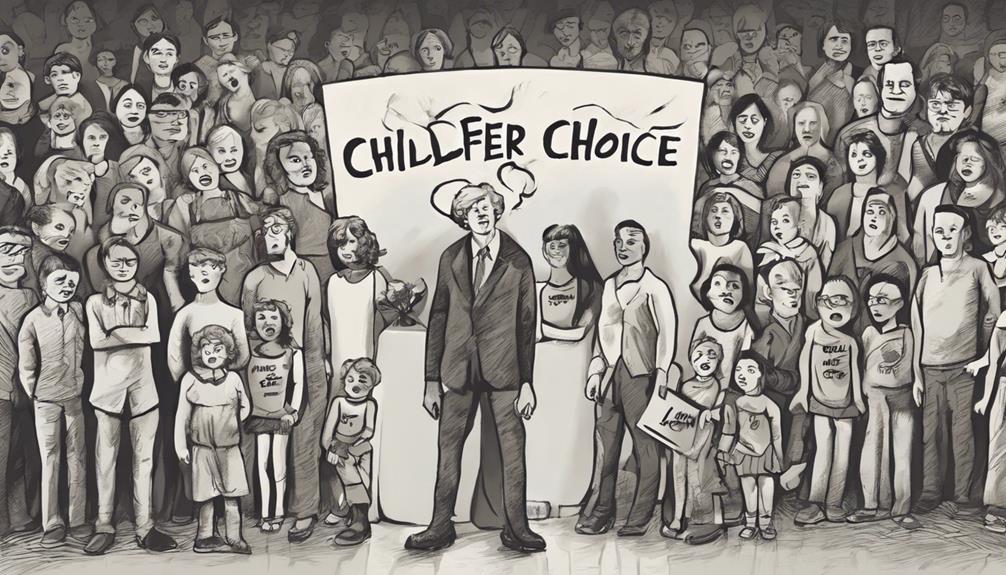Imagine standing at a crossroads, where the path you choose leads to open vistas of self-discovery and freedom, yet casts shadows of doubt and disapproval from those around you.
The decision to embrace a child-free lifestyle can stir a whirlwind of emotions and opinions, sparking debates on personal autonomy and societal expectations.
As we navigate the complexities of choosing to be childfree, we encounter a myriad of conflicts and dilemmas that question our choices and challenge our beliefs.
Are we truly at fault for prioritizing our own desires and boundaries, or does society's gaze cast a shadow of judgment upon our path?
Key Takeaways
- Choosing to be childfree is a valid personal decision that should be respected.
- Childfree individuals deserve understanding and support, not judgment or criticism.
- Setting boundaries and communicating assertively are essential in defending the childfree lifestyle.
- Empowerment and fulfillment come from honoring personal values and living authentically as childfree.
The Stigma of Choosing Childfree
Facing societal pressures, childfree individuals often confront the stigma associated with their decision, navigating misconceptions and defending their choice against traditional expectations of parenthood. Our life choices are deeply personal, yet society sometimes imposes rigid norms that can make us feel judged or misunderstood.
When we opt to be childfree, we challenge the status quo, prompting others to question our motives and values. There's a misconception that our decision stems from selfishness or a lack of fulfillment, when in reality, it's a deliberate choice made after thoughtful consideration of what brings us joy and purpose.
We find ourselves in conversations where we must explain that fulfillment and contribution to society can take various forms beyond parenthood. Despite the challenges, standing firm in our decision allows us to live authentically and align our lives with our true desires.
Embracing our childfree status empowers us to shape our path and define success on our terms.
Societal Pressures and Expectations

Societal pressures often compel individuals to conform to traditional family expectations, nudging them towards embracing parenthood despite alternative desires. The weight of societal norms can be suffocating, making it challenging to break free from the expectation of having children. The constant barrage of messages extolling the virtues of parenthood can overshadow the validity and happiness of childfree lifestyles. This relentless pressure to fit into a predetermined mold can create feelings of isolation and alienation for those who choose a different path.
Judgment, criticism, and social stigma often accompany the decision to be childfree, highlighting society's bias towards those who opt out of parenthood. The assumption that everyone desires or should have children further marginalizes individuals who make a conscious choice to remain childfree. The pressure to conform to traditional family structures can be overwhelming, making it difficult for childfree individuals to assert their autonomy and live authentically.
Personal Choice Vs. Social Norms
Navigating the tension between personal choice and societal norms, childfree individuals confront a myriad of challenges when opting out of parenthood. In a world where having children is often seen as a natural progression in life, choosing to be childfree goes against the grain. Our decision to remain childfree is deeply personal, rooted in our desires, values, and circumstances. It's a choice that challenges traditional expectations and questions the notion that parenthood is the only path to fulfillment.
Despite facing societal pressures, we stand by our decision as a valid expression of our autonomy. We believe in the importance of respecting individual choices, even when they diverge from the norm. It's essential to recognize that personal choice should be celebrated, not judged, in matters as significant as deciding whether to have children. By embracing our decision to be childfree, we pave the way for a more inclusive society that values diverse perspectives on family and parenthood.
Navigating Judgment and Criticism

Amidst societal expectations and unwarranted criticism, child-free individuals often find themselves defending their decision to live without children. It can be challenging to navigate the judgment and criticism that come their way, but finding ways to cope and respond assertively is crucial for maintaining a fulfilling life.
- Invalidation: Friends and family may question the validity of the child-free lifestyle, leading to feelings of inadequacy and self-doubt.
- Criticism from Strangers: Unsolicited opinions from strangers can be particularly hurtful, as they often lack insight into the complexities of one's life choices.
- Pressure to Conform: Society's emphasis on parenthood as a defining aspect of adulthood can create a sense of alienation for those who opt out of having children.
- Seeking Support: Connecting with like-minded individuals or supportive communities can provide a sense of belonging and understanding in a world that may not always validate their choices.
Navigating judgment and criticism is a part of every child-free individual's life, but finding solidarity and confidence in their decision can lead to a more empowered and authentic existence.
Misconceptions About Childfree Individuals
Childfree individuals commonly encounter misconceptions surrounding their lifestyle choices, often leading to unfounded assumptions and judgments. These misconceptions can stem from societal norms and beliefs that equate parenthood with fulfillment and purpose. Here are some common misconceptions about childfree individuals:
| Misconception | Description |
|---|---|
| Selfishness | It is often assumed that childfree individuals are selfish for prioritizing their own needs and desires over having children. |
| Anti-Child | Many people mistakenly believe that childfree individuals are against children altogether, when in reality, they simply choose not to have their own. |
| Career Focus | There is a misconception that childfree individuals prioritize their careers over starting a family, without considering other valid reasons for their choice. |
| Lack of Fulfillment | Society sometimes misunderstands that childfree individuals can lead fulfilling lives without having children, assuming that parenthood is the only path to contentment. |
These misconceptions can lead to misunderstandings and unwarranted judgment towards those who have chosen a childfree lifestyle.
Setting Boundaries With Family and Friends

Despite these misconceptions, childfree individuals often find it necessary to establish clear boundaries with family and friends to maintain their preferred adult-focused social interactions. In navigating these relationships, setting boundaries becomes crucial for ensuring that both parties respect each other's choices and preferences.
Here are some strategies childfree individuals might use when setting boundaries with family and friends:
- Communicate openly: Expressing your desire for adult-only spaces and time can help others understand your perspective.
- Establish limits: Setting clear boundaries on topics like parenting advice can prevent misunderstandings and conflicts.
- Create alternative plans: Suggesting child-free meetups or activities can ensure that everyone feels included and comfortable.
- Reinforce boundaries: Consistently enforcing boundaries, even when faced with resistance, is key to maintaining the desired adult-focused social interactions.
Impact on Relationships and Friendships

When deciding to be childfree, relationships may shift as dynamics change, leading to potential strains on friendships. Support systems might also experience a transformation, impacting the way individuals connect with those around them.
It's crucial to navigate these changes with open communication and understanding to maintain healthy relationships.
Relationship Dynamics Change
Navigating social gatherings as a childfree individual can lead to significant shifts in relationship dynamics and friendships. This change can be challenging, impacting how we interact with friends who've children. Here are some ways relationship dynamics may evolve:
- Organizing Meetups: Difficulty arises in planning friend group gatherings without children present, potentially limiting social interactions.
- Group Dynamics: Avoiding gatherings when children are present can alter the group dynamic and our involvement in social activities.
- Communication Challenges: Clear communication becomes crucial to navigate social expectations around children at adult gatherings.
- Mixed Reactions: Responses to actions like leaving a gathering due to children's presence can vary, leading to mixed feelings among friends.
Friendships May Be Strained
Our friendships may face strains when the preference for adult-only spaces impacts the dynamics of friend groups. The difficulty in organizing meetups without children present can lead to tensions and misunderstandings among friends. When a child-free individual consistently avoids group gatherings due to children's presence, it can create feelings of exclusion and isolation within the friend group. For example, an incident at a wine night where a child-free individual left due to a friend bringing her 8-year-old caused mixed reactions and highlighted the sensitivity of this issue. Clear communication and mutual understanding are crucial to navigating these challenges and maintaining the harmony of friend group dynamics.
| Challenges | Impacts | Solutions |
|---|---|---|
| Exclusion due to adult-only spaces | Tensions and misunderstandings | Open dialogue and compromise |
| Isolation within friend groups | Mixed reactions and strained relationships | Respect for individual preferences |
Support Systems Shift
Shifting our support systems has prompted reevaluation of relationships and friendships amid differing stances on the presence of children in social settings.
- We found ourselves struggling to organize adult-only meetups, causing a shift in friend group dynamics.
- The incident at a wine night emphasized the necessity of adult-only spaces for our comfort.
- Online community responses ignited debates on the appropriateness of children at adult gatherings.
- Balancing our desire for adult-only settings with the dynamics of our friend group has posed challenges in our relationships.
Navigating these changes has highlighted the importance of understanding and respecting each other's preferences, ultimately shaping the evolution of our support systems and the way we connect with those around us.
Self-Care and Mental Wellbeing

Prioritizing self-care and mental wellbeing is essential for individuals who've chosen to be childfree. Without the responsibilities of parenthood, we've the freedom to focus on nurturing ourselves.
This means taking the time to engage in activities that bring us joy and relaxation, whether it's practicing yoga, going for a long walk in nature, or simply curling up with a good book. Self-care isn't selfish; it's a vital aspect of maintaining our overall wellbeing.
Addressing Assumptions and Stereotypes

In confronting assumptions and stereotypes about choosing to be childfree, it's crucial to challenge misconceptions and advocate for understanding and respect.
Here are some key points to consider when addressing assumptions and stereotypes about childfree women:
- Childfree women are often viewed as selfish or immature, but in reality, their decision is valid and personal.
- Misconceptions about childfree women lacking fulfillment or not liking children are stereotypes that don't apply universally.
- Assuming childfree women are anti-family overlooks the diverse ways in which individuals can find meaning and connection outside of traditional family structures.
- Society's pressure on childfree women to conform to traditional family norms can be isolating and dismissive of their autonomy and choices.
Finding Support in Childfree Communities

Joining childfree communities offers valuable support and camaraderie for individuals who've made the decision not to have children. These communities provide a safe space where we can freely express our thoughts, concerns, and joys without fear of judgment. In childfree communities, we can find like-minded individuals who understand our choice and offer meaningful connections. Whether it's discussing relationships, navigating societal pressures, or exploring personal fulfillment, these communities offer a wealth of insights and experiences that resonate with our own.
Being part of childfree communities helps us feel validated in our decision and provides a sense of belonging that can sometimes be lacking in other social circles. Through online forums and social media groups, we can easily connect with others who share similar views and engage in discussions that enrich our perspectives. The support and understanding we receive from these communities create a supportive network that empowers us to embrace our childfree lifestyle with confidence and solidarity.
Responding to AITA Scenarios

When faced with AITA scenarios, we navigate the delicate balance between personal choices and social expectations. Setting boundaries and prioritizing our happiness become crucial aspects of such situations.
Childfree individuals often find themselves at the forefront of debates regarding life choices and societal norms.
Childfree Life Choices
Discussing childfree life choices in response to AITA scenarios can shed light on the challenges faced by those who've made the deliberate decision to not have children.
- Choosing to be childfree allows us to prioritize our own lifestyle preferences.
- We value adult-only spaces and time, relishing social gatherings without children present.
- This choice can create conflicts in social groups where others have children, affecting meetup dynamics.
- Sometimes, we face criticism or a lack of understanding when asserting our preference for adult-only spaces.
Embracing the childfree lifestyle involves intentional decisions that focus on personal happiness and fulfillment without the responsibilities of raising children. These choices are deeply personal and should be respected within our social circles. Many people who choose this path prioritize their careers, hobbies, travel, or personal growth, finding joy and satisfaction in different aspects of life. Gitasav explores childfree living by shedding light on the diverse reasons individuals opt for this lifestyle and the freedom it can bring. Ultimately, leading a childfree life is a valid and enriching choice that contributes to the wide spectrum of human experiences.
Social Expectations Pressure
Navigating social expectations as a childfree individual can present unique challenges when faced with differing views on attending gatherings with children. In such situations, it's crucial to communicate openly to find a balance that respects everyone's preferences. Here is a table illustrating common viewpoints on this issue:
| Viewpoint | Description |
|---|---|
| Supportive | Recognizes the need for child-free spaces and respects individual choices. |
| Critical | Believes clear communication is essential and leaving abruptly may be seen as rude. |
| Justification | Discusses the reasons behind the child-free individual's actions and the importance of understanding their perspective. |
| Group Dynamics | Emphasizes the importance of finding compromises that consider everyone's comfort and enjoyment. |
Personal Happiness Priority
In prioritizing personal happiness in AITA scenarios related to being childfree, we must consider the impact on our well-being and relationships.
- Listen to Your Inner Voice: Trust your instincts and feelings about what truly brings you joy and fulfillment.
- Prioritize Self-Care: Your happiness matters, so make time for activities that nourish your soul and bring you contentment.
- Communicate Openly: Express your personal beliefs and desires with honesty and respect in your relationships and social interactions.
- Set Boundaries: Protect your happiness by setting clear boundaries that align with your values and priorities.
Embracing and Defending Your Decision

Embracing and defending our decision to be childfree requires clear communication and firm boundaries to navigate societal expectations and criticism. Our personal values serve as the foundation for this choice, guiding us towards a life that aligns with our true selves.
By openly expressing our reasons for choosing a childfree lifestyle, we can help others understand and respect our decision. Setting boundaries becomes crucial in protecting our choice from unwarranted judgment or pressure to conform. It's essential to remember that our decision is valid, regardless of external opinions.
Defending our childfree stance may be met with challenges, but staying true to our values and desires empowers us to face criticism with confidence. Embracing this decision means accepting and honoring our need for independence, freedom, and fulfillment on our unique life path.
Frequently Asked Questions
Why Do Some People Choose to Be Childless?
We choose to be childless for various reasons. Some value adult spaces and interactions, while others prioritize personal freedom, career goals, or lifestyle preferences. Flexibility, independence, and pursuing hobbies without constraints are important to us.
Concerns about overpopulation, environmental impact, and financial stability also influence our decision. Prioritizing our relationship, well-being, and mental health over starting a family is essential.
How Do I Find a Childfree Partner?
We seek connections with kindred spirits who share our childfree lifestyle. Engage in tailored dating platforms and gatherings to meet like-minded individuals.
Clearly express our childfree stance early on in relationships to prevent misunderstandings. Discuss our choice with friends and family who might introduce us to potential partners who also eschew parenthood.
Embrace diverse avenues like hobby groups or volunteer work to discover partners aligned with our childfree values.
What Are the Consequences of Not Having a Child?
Not having a child brings freedom and flexibility. We get to focus on personal growth, career goals, and self-care. Our finances are more stable without the added expenses. We enjoy fewer responsibilities and more time for hobbies and relaxation.
The decision not to have children can lead to a fulfilling and stress-free life, but it may also impact relationships with friends and family who have different expectations.
Is It Okay to Not Have Kids?
It's absolutely okay to not have kids. Everyone has the right to choose the path that best fits their life. Not having children can bring immense joy and fulfillment.
We believe that personal happiness and fulfillment should be the guiding principles in making such decisions. Ultimately, what matters most is living authentically and in alignment with our own values and desires.
Conclusion
In conclusion, being childfree is a valid and personal choice that should be respected.
Did you know that in the United States, the number of childfree adults has been steadily increasing, with around 1 in 5 individuals choosing not to have children?
It's important to challenge societal norms and embrace diversity in lifestyle choices.
Remember, everyone deserves to live authentically and make decisions that align with their values and priorities.









